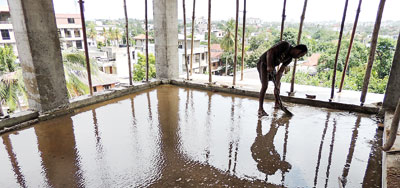News
Building industry to name, shame and penalise dengue offenders
The construction industry regulator will join forces with the Health Ministry to fight the spread of dengue by downgrading builders who let mosquitoes breed on their sites.

Every registered contractor must now complete monthly forms issued by the NDCU regarding water content on sites to ensure there are no breeding places for mosquitoes.
Frustrated by continued carelessness at construction sites, the Health Ministry has enlisted the assistance of the Construction Industry Development Authority (CIDA) to control dengue in the Western Province.
It has requested CIDA to appoint safety officers to oversee suspect construction sites.
Of the potential breeding sites found 10% were construction sites, investigations carried out during National Mosquito Control Week from September 26 to October 2 show, the National Dengue Control Unit (NDCU) said.
A third of the suspected cases of dengue fever in hospitals are from the Western Province.
Community specialist Dr. Priscilla Samaraweera said the Health Ministry had been relying on contractors to take responsibility for keeping sites clean but that due to many incidents of irresponsibility it had co-opted CIDA to maintain order.
Every registered contractor must now complete monthly forms issued by the NDCU regarding water content on sites to ensure there are no breeding places for mosquitoes.
Copies of the forms must also be submitted to CIDA, the organisation’s chief, Suvinda Amarasekera, said.
CIDA has drawn up a penalisation scheme whereby contractors would, for the first and second times of offending, have their names displayed on the CIDA notice board. “If they offend the third time the contractor will be downgraded,” Mr. Amarasekera said.
That would be a severe blow to contractors, who covet their grading as it brings them work, Mr. Amarasekera said.
He added, however, that although this system would allow CIDA to monitor major building sites, residential and small sites could not be monitored by the body. It is learned that although there are more than 10,000 contractors, only 4,000 are registered with CIDA.
“Around 5000 contractors are into small construction and has to be monitored by the Health Ministry,” Mr. Amarasekera said.
Health Ministry Public Health Officers are to make regular visits to sites. Offenders will be given warnings, with repeated offenders being prosecuted.
Dr. Samaraweera said during dengue control week, 93,000 potential breeding sites around the country were detected. These included schools, institutions and households. Three thousand teams consisting of public health officers, members of the armed forces and the police had assisted 67,000 offenders to clean up their premises immediately.
Around 16,000 red notices were issued and 2,700 offenders were charged. The maximum penalty is Rs. 5,000 and the NDCU is seeking to increase the penalty to Rs. 25,000.
The NDCU is planning a three-day programme to be carried out in vulnerable areas including the Western Province, Jaffna and Puttalam areas. “We need to be vigilant as the rains can exacerbate the situation,” Dr. Samaraweera said.
According to the Epidemiology Unit, there has been a 70 per cent drop in the number of cases reported, with one-tenth the number of deaths. Up to September 2018 there were 39,000 cases reported, with 40 deaths. Last year, in the same period, 186,101 suspected cases were reported, with 400 deaths countrywide.

